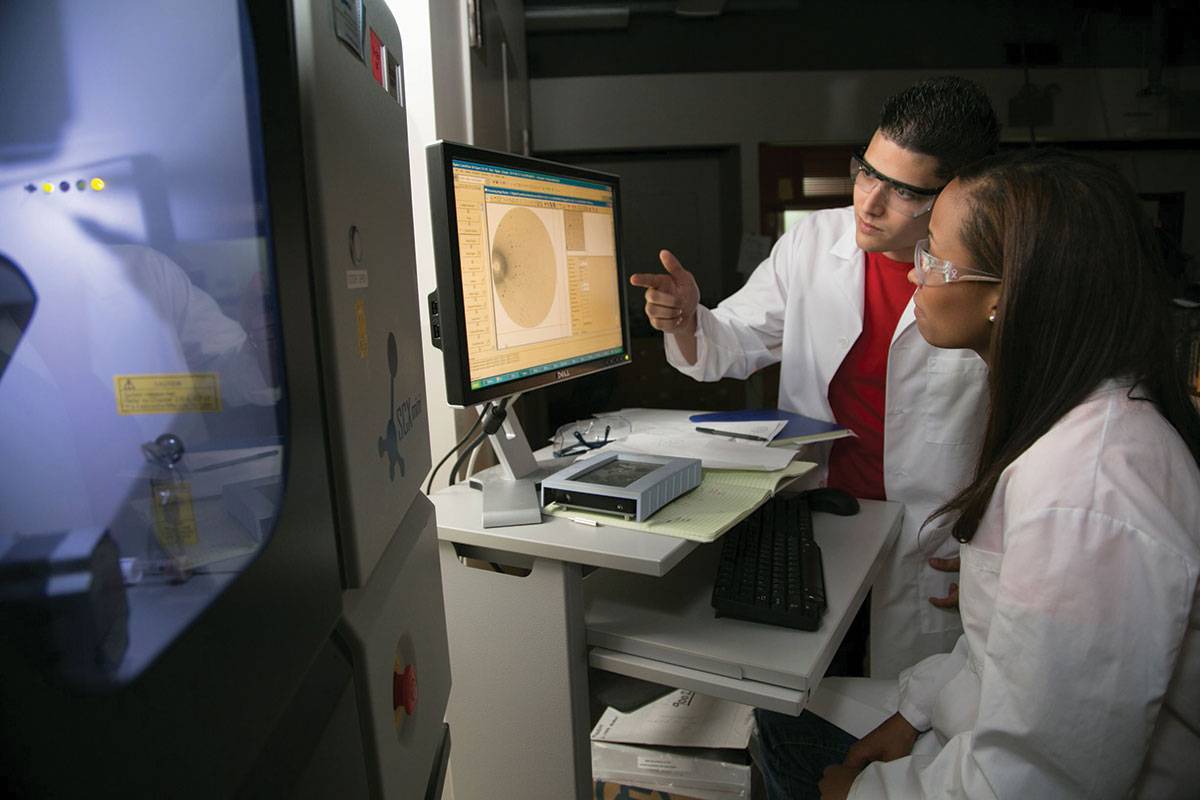Chemistry (M.A./M.S.)
M.A./M.S. Chemistry

Program Overview
Chemistry and biochemistry faculty have been recognized nationally and internationally for both stellar teaching and research. Students and faculty actively conduct cutting-edge research funded by the National Science Foundation, the U.S. DoD, and the National Institutes of Health. The department is also home to the nationally-recognized Xiphophorus Genetic Stock Center.
Course Work
The master of science (M.S.) degree in chemistry is a research degree that normally requires two years of enrolling in 9 credit hours each semester and research in order to complete. The degree requirements include 30 hours composed of 21 hours of lecture course work, three hours of departmental seminar, and six hours of thesis research support courses. The M.S. in chemistry degree includes courses in organic chemistry, physical chemistry, analytical chemistry, and elective courses. The master of arts (M.A.) in chemistry has the same credit-hour requirement as the M.S., but a thesis is not required.
| Degree | Hours | Thesis Option | Minor Option | Location |
|---|---|---|---|---|
Degree M.A. | Hours 30 | Thesis Option Non-Thesis | Minor Option No minor | Location San Marcos |
Degree M.S. | Hours 30 | Thesis Option Thesis | Minor Option No minor | Location San Marcos |
Program Details
Current students are recognized at international, national and regional levels through scholarships and research competitions. Graduates have been very successful in pursuing professional careers in medicine, pharmacy or doctoral education.
Program Mission
The programs in the Department of Chemistry and Biochemistry cultivate students’ ability to:
- perform both qualitative and quantitative laboratory procedures
- synthesize, purify, and/or characterize a variety of chemical/biochemical compounds
- search the scientific literature and accurately cite published information
- accurately and thoroughly describe experimental procedures
- critically evaluate and report experimental results
- interpret and solve problems in chemistry and biochemistry
Related Program: M.S. in Biochemistry
Career Options
Upon graduation, students will be prepared for a variety of career paths, including positions in the following:
- environmental scientist
- toxicologist
- forensic scientist
- science education
- pharmaceutical sales representative
- research assistant
- industrial chemist
- biomedical technician
- analytical chemist
- material scientists/technicians
Program Faculty
As teacher-scholars equally devoted to both roles, department faculty are committed to maintaining and improving the quality of student instruction and have established a research program that emphasizes student involvement. Faculty also focus on grant support and publications and have fostered a service component that benefits the department, college, university, profession, and community at large. Fields of research include: analytical, inorganic, organic, polymer, and physical chemistry and chemical education, as well as protein biochemistry, biomaterials, molecular biology, and biophysics.
Contact us for general questions about your application, funding opportunities, and more. If you have specific questions after reviewing the program details, contact the program's graduate advisor.
Graduate Advisor
Dr. Chang Ji
cj22@txstate.edu
512.245.4949
Chemistry (CHEM), Room 315

Apply Now Already know that Texas State is right for you?
Application Deadlines
| Deadlines | U.S. Citizen | International |
|---|---|---|
Deadlines Fall - Priority | U.S. Citizen February 1 | International February 1 |
Deadlines Fall - Standard | U.S. Citizen April 1 (*Flexible) | International April 1 (*Flexible through June 1) |
Deadlines Spring | U.S. Citizen October 1 (*Flexible) | International October 1 |
*A flexible deadline means applications received after the standard deadline may be reviewed on a first-come, first-served basis with no guarantees for admission consideration.
|
|
Funding Information Applications must be complete by the priority deadline to be considered for certain types of funding. |
|
|
Decision Timeline This program reviews applications on a rolling basis. |
Admission Requirements
The items required for admission consideration are listed below. Additional information for applicants with international credentials can be found on our international web pages.
-
Application
- Completed online application
Review important information about the online application.
-
Application Fee
- $55 Nonrefundable application fee, OR
- $90 Nonrefundable application fee for applications with international credentials
Review important information about application fees.
-
Transcripts & GPA
- baccalaureate degree in chemistry from a regionally accredited university (Non-U.S. degrees must be equivalent to a four-year U.S. Bachelor’s degree. In most cases, three-year degrees are not considered. Visit our International FAQs for more information.)
- a copy of an official transcript from each institution where course credit was granted
- a 3.0 overall GPA or 3.0 GPA in your last 60 hours of undergraduate course work (plus any completed graduate courses)
Review important information about transcripts. Official transcripts, sent directly from your institution, will be required if admission is granted.
-
Test Scores
GRE
- GRE not required
Approved English Proficiency Exam Scores
Applicants are required to submit an approved English proficiency exam score that meets the minimum program requirements below unless they have earned a bachelor’s degree or higher from a regionally accredited U.S. institution or the equivalent from a country on our exempt countries list.
- official TOEFL iBT scores required with a 78 overall
- official PTE scores required with a 52 overall
- official IELTS (academic) scores required with a 6.5 overall and
- minimum individual module scores of 6.0
- official Duolingo scores required with a 110 overall
- official TOEFL Essentials scores required with an 8.5 overall
This program does not offer admission if the scores above are not met.
Review important information about official test scores. -
Documents
- statement of purpose discussing your career goals and undergraduate experiences
- two letters of recommendation regarding your academic potential and undergraduate research experience
Review important information about documents.